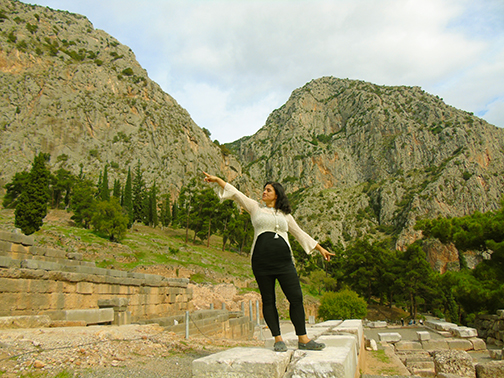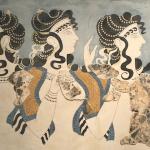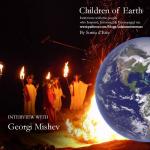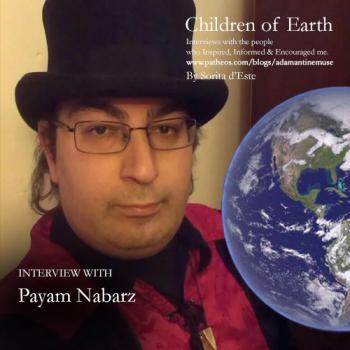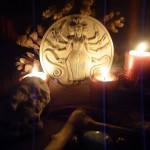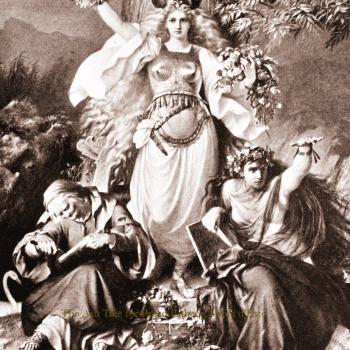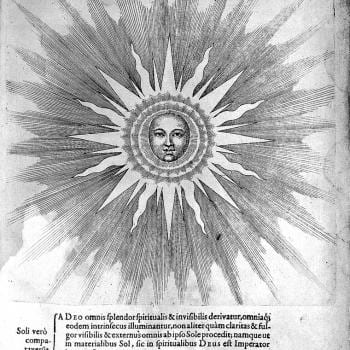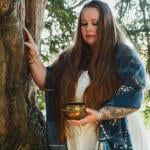Katie Gerrard was among the first Priestesses I met on the London scene who was one of my peers, she is slightly younger than me and when we first met we were both among the much younger generation of High Priestesses in the Craft scene in London. It was in the early ’00s, both of us had already been exploring the Craft and other Pagan and Magical Traditions for a few years. Katie and I may have very different approaches to the way in which we approach our Gods and our Craft, but I respect Katie for her honest and open approach to teaching, writing and speaking about her work – and her dedication. Back then we were the youngsters on the scene, but now 20 years on we are definitely becoming the Elders!
It is a pleasure for me to introduce Katie and her work to a different readership here on Patheos through this first Children of Earth interview – in which I will be interviewing some of the many people whose work informed, inspired and encouraged me in this lifetime.
Sorita d’Este interviews Katie Gerrard
Children of Earth on Adamantine Muse
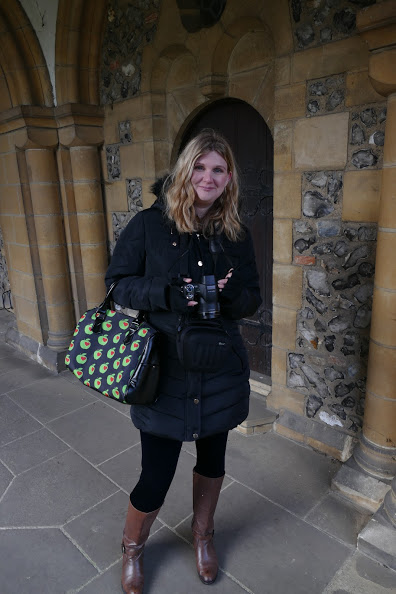
Sorita – Greetings Katie! You have been involved in magic and Paganism for a very long time now. How did you first become aware of the importance or presence of the Gods and Magic in your life?
Katie Gerrard – I guess it’s something that has always been part of my life, starting with the role of the ancestors and the everyday magic of living. I was a voracious reader as a teenager and made my way through many pagan, witchcraft, and mind body spirit type books forming opinions and ideals as I went.
I was lucky enough at the age of eighteen to go to a University which had a pagan society and by the end of my first year an outdoor ritual site on campus with dugout circle and a permanent altar. I was able to gain an enormous amount of practical ritual experience here and learn about the different pagan paths and deities. This, in turn, led to me meeting the people who would later introduce me to Wicca.
Sorita – Many people will know you because of your books Odin’s Gateways and Seidr: The Gate is Open (both published by Avalonia). Both these books are rooted in your love of the Norse Gods and their magic. Why do you feel that you are drawn to the Norse gods so much?
Katie Gerrard – I work almost exclusively with the Norse gods in my individual practise, so much, so the Norse current feels very much a part of me. It defines the core of my magickal work. I don’t know whether I would say I was drawn to the Norse gods or they were drawn to me, but it feels very much more than merely a choice I made.
The Norse deities are very direct and no-nonsense. There’s no need for remembering long texts or praying at certain moon phases. You don’t need expensive ritual equipment or to wear the right colour for the planetary energy. I’m not a complicated person, and I don’t like following rules for the sake of rules. I don’t worship my gods; I work in partnership with them, acknowledging that we need each other. The Norse gods require bargaining and negotiation – if they ask you to do something you have the right to say no, or not yet.
Sorita – You are, of course also a prominent High Priestess of Initiatory Wicca in the UK; a tradition you have been involved with now for more than 20 years. What do you feel has changed in Wicca since you took your own first steps?
Katie Gerrard – In some ways, lots of things have changed but in others very little. When I first started out the internet did exist (making me sound old now!) but there were only a small amount of pagan websites, and you had no way of verifying if you were indeed talking to initiates. Now you can theoretically be in contact with the majority of initiates with a few clicks and a friend request. It’s no longer a case of meeting someone at a moot and taking their word for whom and what they are.
There’s a lot more choice in terms of lineage now too, a seeker can decide if they want to be Gardnerian, Alexandrian… and even what kind of these strands they want. When I was initiated I didn’t even ask what *kind* of Wicca I was getting into; the distinction didn’t worry me. I wanted to be a witch. It’s only twenty years later I find others asking why I chose the particular Wiccan path I did.
We’re also more aware of our history and protective of tradition. In some ways, this can be a good thing, but in others, I feel we sometimes do things which aren’t practical based on an ‘it’s always been this way’ explanation. Our fabulous lace and crushed velvet robes say more about the fashion of the seventies when many of the media photographs were taken than they do sensible behaviour around candles! Similarly, you don’t need a book containing all your favourite spells written out in your own hand when you have the iCloud and your camera phone.
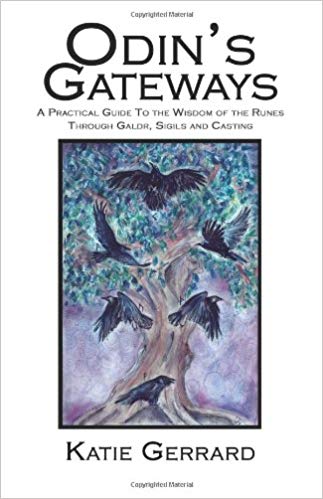
Sorita – 20 years ago, if memory serves me right, there was a lot of discussion about being eclectic (drawing from different, outside traditions, in our practices) and also about whether or not those who are homosexual should be accepted as initiates into a tradition which appears to put a lot of emphasis on male-female polarity. Today the debate has moved onto whether same-sex initiations should be allowed and recognised and whether transsexual individuals should be accepted as initiates. What are your views on this often sensitive topic?
Katie Gerrard – I feel we’ve almost gone backwards in the last twenty years in terms of eclecticism and freedom to practise in the way that works for our groups. Same-sex initiation seems to be a very emotive subject recently with some very vocal opinions on both sides. I tend to look at reasons why something might have been done in a certain way and then decide whether it’s still relevant now. Looking at Gardner’s writing, it was ok for a woman to ‘strap on a sword’ when she couldn’t find a priest, but he doesn’t mention the alternative for a man. We also know Alex Sanders was more than happy to initiate men. It was also ok for a man to initiate his son or a woman to initiate her daughter, but not for someone to initiate an opposite-sex direct descendant.
Often this is cloaked in an explanation of polarity and sexual energy – as in opposite genders creates a certain spark. So then is same-sex initiation only for those who are gay or bisexual? I think history really gives us the answer to this one. When Gardner was writing about Wicca, witchcraft had only just been made legal. Male homosexuality, on the other hand, was still very much illegal. Was Gardner protecting his new tradition by being clear, whilst men were naked with other men, nothing illegal was happening? Men didn’t stand next to other men or pass the wine on with a kiss unless it was to a woman, and men certainly didn’t give each other initiations. No need for the law to be involved. Of course, by Alex’s day, homosexuality was legal, and this was no longer a concern – meaning he had no reason to make it taboo.
With this in mind, I’m happy to acknowledge same-sex initiations, whatever your sexuality. However, it’s worth mentioning an initiate isn’t always in the best position to be given that choice. They haven’t experienced the wider Wiccan community yet, and they are the one who will face any backlash or be told they aren’t ‘valid’. Is it fair for us to ask them to make that decision?
In regards to transsexual individuals, I wholeheartedly believe people should be accepted as the gender they identify as in all areas of their lives, including initiation. I’m not a fan of ‘men only’ and ‘women only’ spaces anyway. In the same way, I can’t understand why drawing down a deity into a person of an opposite gender should be an issue.
Sorita – Today there is so much more information available than there was when we were taking our first official steps in the 1990s. Too many books and websites to count, and often with very conflicting information which can be incredibly confusing to newcomers. How do you feel this information revolution has changed the face of Wicca today?
Katie Gerrard – I think there will always be conflicting information, and the internet doesn’t help. But it’s the same with all subject areas where there isn’t one true way, whether you’re trying to teach your dog not to bark or to wean your baby… or even grow cucumbers!
I still think the core of Wicca is something you can’t access online. I can describe to you the fragrance and feel of a rose, but you’ll never experience it truly until it’s in your hands. That doesn’t mean you can’t walk through the countryside and find your own roses growing, or that I can’t send you some seeds in the post to plant. But without the rose in your hand, no description will give you the same experience.
We’re in an interesting time where anyone can write a book, or a song, or design a t-shirt. Anyone who wants to create and share has the opportunity, and that to me is a beautiful thing. But we’re overloaded with information and art and therefore finding that perfect needle in a haystack text is hard work. In a way, it makes people more unlikely to engage than they would have been in the past, and that means Wicca is still something you need to search for and put effort into experiencing.
Of course, Wicca has always been full of conflicting information; it’s just that you may not have met people from outside of your line. It carries from Gardner and Valiente’s ‘long line of hereditary witches’ to Alex’s grandmother down to the ‘ancient Irish potato’ and ‘horse whisperer who met Aleister Crowley’.
Sorita – In Initiatory Wicca members usually gather in Covens for the Full Moons and the Sabbats – which makes for more than 20 meetings a year. Is this still practical in a world where we are all rushing from one thing to the next?
Katie Gerrard – I think things were already changing when I first started out in Wicca and Paganism. The idea of committing to something which needed a weekly appointment was daunting for me even then. Now I can’t even imagine considering joining a group which met once a week or even for twenty meetings a year. It’s hard enough to keep a weekly appointment with a favourite TV program and not need to find it on catch up!
The eight sabbats and thirteen esbats approach can still be possible if everyone lives nearby, but we live in a far more globalised world now. The people I choose to ritual with don’t live in the same town and very often don’t live in the same country. How do we then make space in our lives for a sustainable magickal family, including those we are most drawn to? I would much rather spend two full weeks, or four weekends with a group I choose wherever they may be than twenty meetings with someone who is local. This very much goes for group leaders too, I was not charged for my training, and therefore, I find it uncomfortable charging to teach others. However, I do need to feed and clothe myself and my family and time spent in Wicca is time I’m not earning for so it’s a very tricky balance. I’d rather keep Wicca free and dedicate less time.
I also don’t believe Wicca ‘isn’t for you’ if you don’t have the time or headspace to dedicate prescribed times. You will need to make space and time for it within your life but not everyone has a life which gives them time for meetings. That doesn’t mean you aren’t or won’t be a good witch. In the same way that my life decrees I can’t sit at the same desk 9am til 5pm five days a week but still makes me a great employee on my own terms, my witchcraft shouldn’t be inhibited by personal circumstances that can be worked around.
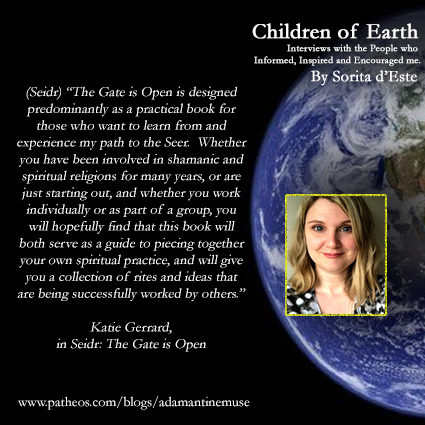
Sorita – Seidr: The Gate is Open has been well received by readers all around the globe interested in exploring Seidr as a practice. However, some readers here may not know what Seidr is. Can you say more about what this practice involves?
Katie Gerrard – Seidr is really an umbrella term for what is often referred to as the more feminine side of Norse inspired magic. It’s hard to define in a way that doesn’t suggest one person’s seidr is more valid than another, which is certainly never true.
For me, it represents anything inspired by magical acts in the Norse sagas and mythology. It is acunning craft; it bends reality and shapes fate. Often seidr can represent out of body work – travelling the nine worlds, astral travel as an animal, appearing as a nightmare at the bedside of an enemy. Often it uses the voice to inflict change or create solutions.
There’s no ‘how to’ guide in the sagas, therefore, practitioners have had to guess and borrow from other traditions giving a varied and experimental practise.
Sorita – How has your experience and the knowledge you have gained through your Seidr practice influenced your Wiccan practice? (If at all).
Katie Gerrard – Technically the Seidr came first, so it has always been a part of my Wiccan practice. I don’t like to be too prescriptive with labels however, so there tends to be a crossover between the two. I will happily work with seidr inspired practises within a Wiccan circle and always have done.
I’m a product of everything I’ve experienced and read. Many Wiccans are careful to keep the rites as they were taught, which in many ways is great because it means I don’t have to. The tradition continues despite me mixing things up a little.
Sorita – What advice would you give to the younger you about to start your first Coven?
Katie Gerrard – I guess the one thing my younger self needed to know goes beyond the coven and would simply be ‘There’s no rush, you don’t have to do everything now.’ I was always the first person to jump in and start doing, without thinking or planning.
More importantly, I’d say, don’t ignore everyone when they tell you to keep journals and diaries. When I was in my early twenties, I genuinely had a perfect recall for what had happened in rituals and books I’d read. I thought I was just blessed with a perfect memory when, in reality, I had fewer years of life to have to remember! Now I have to rely on other people’s meticulous record taking to remember how to recreate magickal workings. It’s coming up to ten years since I wrote ‘The Gate is Open’ and I need the book in front of me to remember most of the rites; particularly the Disir circle which luckily a couple of people have added to websites giving me much better access in a hurry!
I would also tell myself to get out more and be seen. We were fortunate to have the gods bring us the right people for the group, so weren’t as ‘on scene’ as we could have been. I do prefer to do things in the background, but the group missed out on sharing the innovative and (in my humble opinion) exciting things we were working on.
Lastly, I would tell myself to cherish all those wonderful witches who were with us in real life, with wisdom to share and stories to tell. I spent so long working with the dead I didn’t appreciate the ancestors I saw regularly and didn’t have to travel to the underworld to learn from. What I would give now to ask questions face to face.
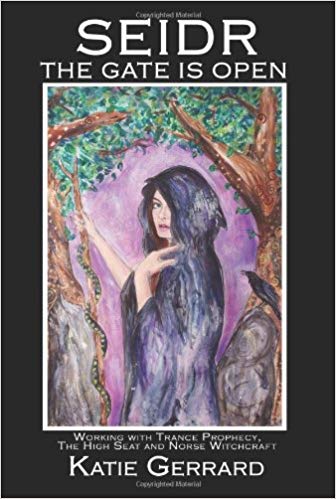
Sorita – I have many bugbears with misinformation being perpetuated in contemporary Pagan books and websites. Is there anything you would like to see change and improve so that the many Pagan traditions, but in particular those you are involved with, will be better for the next generation?
Katie Gerrard – Having said I miss the wisdom of those who have passed, I’m going to say the opposite now and wish pagans trusted themselves more. Maybe it was because I came from the progressive (i.e. Progressive Witchcraft) line where everyone’s ideas and experiences were as valid as each other’s, but I feel there’s less trust in instincts now than when I first started out. I’ve used up most of my ideas now and become part of the system. I don’t question the way things are done because I’m too sucked into the world of ‘that’s the way it is’. New faces and minds are invaluable, so long as we trust them and they trust themselves.
We need new voices to shout, to question, and to suggest new ideas. So many people seem afraid to use their own thoughts. Sometimes when I’m asked to teach specific aspects of my work I say ‘You know, I just cobbled together a few things, oh and that bit I just made up. Do the same. And then go write a book, so I get to learn new stuff too.’
When it comes to misinformation, I do find it frustrating, but I think its part of human nature to misremember or misquote. It happens. It’s only a problem when practises and traditions are immovable. If we check in every now and again and decide if that bit is still relevant or if the bit we threw out is now calling to us we won’t be weighed down by the urban myths. History is shaped by the historian’s viewpoint as much as the evidence and changes with culture.
Trivialities:
- Your favourite book of all time?
It’s impossible to choose just one book but if I had to I’d go for ‘Keep the Aspidistra Flying’ by George Orwell.
- Your favourite character from history?
Anne Boleyn, always. - Your favourite element?
I don’t really work with the elements anymore so couldn’t pick a ‘favourite’. I’m probably opening myself up for an argument or two here but I don’t invoke elements at the quarters anymore. I live in an area with beautiful sunshine, chalk cliffs, crashing waves, and whistling winds. When everything is in perfect balance there’s no need to force favourites.
- Your favourite food?
Anything spicy! I love all kinds of curries and Mexican/ Caribbean food.
- Your favourite number?
5!
- Your favourite planet?
Again I’ve never really worked with the planets. I’ll mutter about mercury being in retrograde occasionally, but apart from that they don’t impact on my thoughts.
- Your favourite plant?
Peas! They grow without any effort and taste wonderful straight off the plant and out of the pod.
- Your favourite stone?
My favourite stone is Lapis Lazuli because I love blue and gold
- Your favourite Tarot / Oracle deck?
I’m a purest when it comes to Tarot, always the Rider Waite, never anything different. I have the same pack I bought in my teens
- Your sunsign?
My sun sign is Pisces with a Leo rising, empathetic and showy and selfish!
About Katie Gerrard
Katie Gerrard is a writer, researcher and workshop facilitator with a passion for the magic of Seidr and the Runes. She has been studying the different forms of Norse witchcraft and working with the Norse gods since discovering them in the late 1990s when she was at University in West Wales.
Katie is also a Wiccan HPS and ran small groups in London for many years, including initiatory Wiccan covens and Seidr practice groups. She facilitates workshops at national, international, and local events and her books Seidr: The Gate is Open (2011) and Odin’s Gateways (2009) are both published by Avalonia.
Katie lives by the sea with her family and enjoys creative pursuits such as fashion design, photography, and sewing. For more information visit www.redthanet.com

